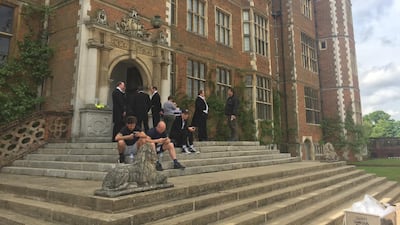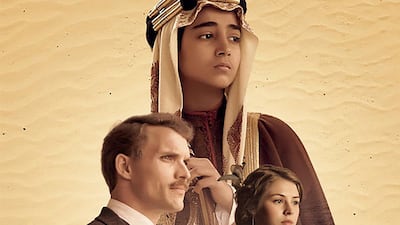Producers of a new film about a young King Faisal's diplomatic mission to London had a very special collaborator: his son, Prince Turki Al Faisal.
Born a King takes place in 1919, and centres on then Prince Faisal's trip to London when he was 13 years old, a trip which laid the foundations for the formation of Saudi Arabia. The film is being heralded as Saudi Arabia's first big feature film, and it premieres in the UAE on Tuesday.
Speaking for the first time about his role in creating the movie, British screenwriter Henry Fitzherbert calls the experience "a dream come true". He also describes the film as an "Arabian version of The Crown".
Fitzherbert was working on another film at the same time, Slaughterhouse Rulez, a "boarding school horror comedy" starring Simon Pegg and Michael Sheen, when he was approached for Born a King. It was to be his first experience of working on a project set in the Middle East.
"On the surface, [Slaughterhouse Rulez] could not be more different to Born a King. But there are surprising parallels. Both are coming-of-age tales about outsiders trying to navigate the British establishment, and both star Hermione Corfield. However, there are no flesh-eating monsters in Born a King," Fitzherbert says.
Born a King is based on a diplomatic mission by Prince Faisal on behalf of his father King Abdulaziz Al Saud, who was the Emir of Nejd and Head of the House of Saud at the time, in order to secure the formation of a new country: what would later become Saudi Arabia.
In London, Prince Faisal had to negotiate and meet with some of the most important figures of the period: including Winston Churchill, Lord Curzon, Princess Mary, Lawrence of Arabia and the Prince of Wales, who later became King Edward VIII.

"It’s a David and Goliath story in which the ‘David’ is a young Muslim boy from the desert who has never before left home," Fitzherbert says. "But on a simple human level it is a story of unlikely friendships and cross-cultural respect and understanding."
One hundred years may have passed since, but Fitzherbert believes what takes place on the big screen is an accurate depiction of the historic mission. "We don’t know everything that happened while he was here, but he was received by King George V and he did meet with Lord Curzon who infuriated him by patronisingly offering a bowl of sweets (a scene replicated in the film)."
Besides, film crews had an enviable edge in creating the film, with the help of Prince Turki, who was "incredibly generous with his time".

The former Saudi intelligence head and senior diplomat provided crucial and personal anecdotes and information about his father, who died in 1975.
"He also corrected my biggest faux-pas in the screenplay – I had described a battle scene in which the camels and horses charged together, which turned out to be completely wrong as the animals can't stand each other. They would ride into battle well apart,” Fitzherbert says.
Born a King was the "vision" of Oscar-winning Spanish film producer Andres Vicente Gomez.
It is directed by Balearic Spanish director Agusti Villaronga, who until now has directed mostly Spanish films and television projects – his film Black Bread was Spain's 2010 submission to the Oscars. This is his first English production.

The cast includes a number of Saudi actors and crew, with filming taking place between the kingdom and London. In Saudi Arabia, scenes reminiscent of early 20th century Arabia were shot in remote locations in the western deserts of Saudi Arabia, and in small villages and forts "barely changed over 100 years". One key location was at Prince Abdulaziz bin Fahad's farm in Diriyah, which was made to look like the kingdom might have back then.
The locations were chosen for their inaccessibility and their nature of being seemingly "closed off" to the world, Fitzherbert says.

In the United Kingdom, several historic English buildings were transformed into more famous landmarks: Goldsmith’s Hall in London provided the perfect place to recreate the throne room at Buckingham Palace, while Hatfield House in Hertfordshire doubled as St James’s Palace, where the Prince of Wales hosts a dinner for Prince Faisal, Lord Curzon, Churchill and TE Lawrence (Lawrence of Arabia).
The cast and crew was a similar mix of British and Saudi nationals.
Eighteen-year-old Saudi actor Abdullah Ali plays Prince Faisal, and is joined by fellow Saudi and Jaber actor Rawkan Binbella as his father.
British actor Ed Skrein (Alita: Battle Angel, If Beale Street Could Talk, Game of Thrones) plays the character of Harry St John Bridger Philby, Hermione Corfield (Star Wars: The Last Jedi, Mission: Impossible - Rogue Nation) plays Princess Mary, and Laurence Fox (Elizabeth: The Golden Age, Becoming Jane, Victoria) plays Lawrence of Arabia / TE Lawrence.

Fitzherbert says the film crew was made up of "the very best professionals", and that he was particularly impressed with director Villaronga.
"We clicked straight away, bonding over our shared love of Hitchcock, and we had exactly the same vision for the movie, so it was a joy. Despite the bleakness of some of Agusti's other work he has a great sense of humour and there's quite a bit of gentle humour in Born A King."
Fitzherbert was also impressed with the resources at his disposal, which he says were unheard of for an independent movie.
He recalls writing one scene, a big scale English fox hunt that he was sure the movie producers wouldn't have the budget for.
"But lo and behold, a few months later they had hired an entire hunt and were shooting with drones across the English countryside."
The period covered by the film was a fascinating time for Saudi Arabia, and in particular for the Saud dynasty, Fitzherbert says.
After all, King Abdulaziz (known in the West as Ibn Saud), Prince Faisal's father, went on to become the founder and first ruler of Saudi Arabia when it was formed in 1932. Prince Faisal became the third king of the country, ruling from 1964 to 1975.
"The main challenge was to balance the personal and the political," Fitzherbert says.
"It’s a coming of age story set against an epic backdrop. Prince Faisal is eager to emerge from the shadow of his tough, warrior older brothers and earn the respect of his formidable father, Abdulaziz. The wily British try to seduce and flatter him – attempting to ‘divide and rule’ not just within Arabia but his own family – but he wises up and frustrates their efforts."













